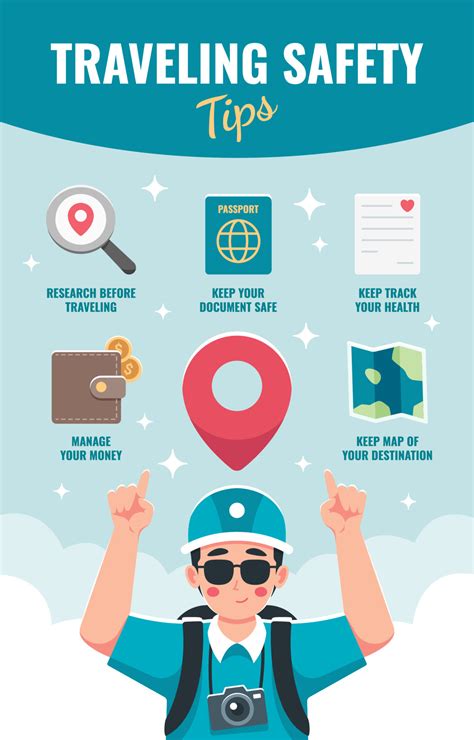7 Travel Safety Tips

Introduction to Travel Safety
Traveling, whether for business or pleasure, can be an exhilarating experience, offering a chance to explore new cultures, meet new people, and create lifelong memories. However, like any other activity, traveling comes with its own set of risks. Ensuring your safety while traveling is paramount, and with the right knowledge and precautions, you can significantly minimize these risks. In this article, we will delve into 7 essential travel safety tips that every traveler should know.
Understanding Travel Risks
Before we dive into the safety tips, it’s crucial to understand the types of risks you might face while traveling. These can range from petty theft and scams to more serious issues like natural disasters, political unrest, and health emergencies. Being aware of these potential risks allows you to prepare and take necessary precautions. For instance, researching your destination thoroughly can provide valuable insights into local customs, safety concerns, and emergency services.
1. Research Your Destination
The first step in ensuring your travel safety is to research your destination. Look into the local crime situation, political stability, and any health concerns. Websites like the official government travel advisory website can provide detailed information on safety and security concerns for your destination. Understanding the local culture and customs can also help you avoid unintentionally offending locals or getting into unnecessary trouble.
2. Plan Ahead
Planning ahead is key to a safe trip. Book your accommodations in safe areas, and consider the proximity to emergency services, public transport, and local amenities. Make digital copies of your important documents (like your passport, visa, and travel insurance) and leave a copy with a trusted friend or family member back home. Also, inform your bank and credit card companies of your travel plans so they don’t flag your transactions as suspicious.
3. Stay Informed
Staying informed about local conditions is vital. Register with your government’s travel advisory program to receive important safety and security updates about your destination. Follow local news and official government social media accounts to stay updated on any developing situations that could affect your safety.
4. Be Aware of Your Surroundings
When you arrive at your destination, be aware of your surroundings. Avoid displaying signs of wealth (like expensive jewelry or watches), and keep an eye on your belongings, especially in crowded areas or tourist hotspots. Avoid walking alone in isolated areas, especially at night, and use reputable taxi services or ride-sharing apps.
5. Health and Safety Precautions
Ensure you have all the necessary vaccinations for your destination, and consult your doctor about any medications you might need to take. Pack a travel health kit with essentials like pain relievers, band-aids, and any personal medications. Also, know what to do in case of a medical emergency, including the location of the nearest hospital and how to call for emergency services.
6. Secure Your Belongings
Safeguarding your belongings is another critical aspect of travel safety. Use hotel safes for valuables, and consider using a money belt or a secure bag for carrying your essentials. Be cautious of scams and pickpocketing, especially in crowded areas or public transport. Keep your luggage secure, and never leave it unattended.
7. Stay Connected
Finally, stay connected with family and friends back home. Let them know your itinerary and check in regularly. Consider purchasing a local SIM card or portable Wi-Fi hotspot to stay connected. In case of an emergency, having a means of communication can be a lifesaver.
📝 Note: Always trust your instincts. If a situation feels unsafe, it's better to err on the side of caution and avoid it.
In summary, travel safety is about being prepared and aware. By researching your destination, planning ahead, staying informed, being aware of your surroundings, taking health and safety precautions, securing your belongings, and staying connected, you can significantly reduce the risks associated with traveling and have a safe and enjoyable trip.
What should I do in case of a medical emergency while traveling?
+
In case of a medical emergency, contact local emergency services immediately. If you have travel insurance, reach out to your provider for assistance. It’s also a good idea to research the location of the nearest hospital and understand how to access medical care at your destination before you arrive.
How can I protect my belongings from theft while traveling?
+
To protect your belongings, use secure luggage, keep valuables in a safe place, and be mindful of your surroundings, especially in crowded areas. Consider using a money belt or a secure bag for carrying essentials. Additionally, make digital copies of your important documents and leave a copy with a trusted friend or family member.
What are some essential items to include in a travel safety kit?
+
A travel safety kit should include essentials like a first-aid kit, a portable charger for your phone, a money belt, copies of important documents, and any personal medications. Depending on your destination, you might also want to include items like a water purification tablet, a travel adapter, or a small flashlight.